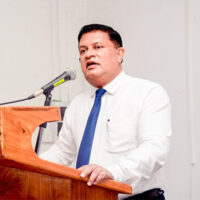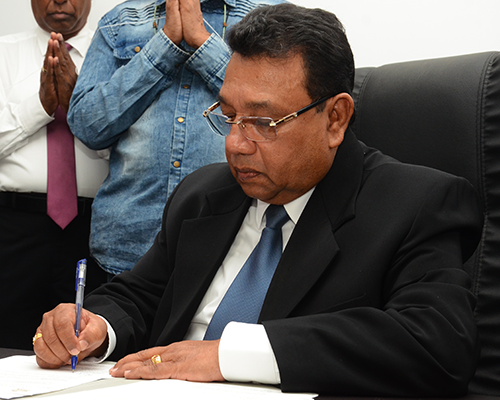
Chairman’s Message

Mr. Devagiri Bandara
Chairman - National Food Promotion Board
It gives me great pleasure to take part of an innovative agro food industry in Sri Lanka ensuring food security and national prosperity through multi-sectoral approach toward achieving of sustainable development goals. Further, Sri Lanka is focused toward blue green economy policy where it is envisages to create an eco friendly environment for all. With the changing of economy and social scenarios, life style and food consumption pattern in Sri Lanka has dramatically been changing over the years.
Since, changing of consumption pattern in Sri Lankans non-communicable diseases are increasing day by day. Sri Lanka has been witnessing in the past few decades a rapid upsurge of non-communicable diseases which includes epidemics of diabetes, various cancers, and increased blood cholesterol levels, claiming many lives each year. In general, 75% of all deaths are due to non-communicable diseases in Sri Lanka. These are all problems related to food habits. Therefore, food transition from tradition to unhealthy western pattern could be considered to be a severe public problem within the country.
From the invasion of western power, the presence of ancient indigenous knowledge, including an incredible wealth of experience about food habits, health, and longevity, has progressively waned. Even after the independence Sri Lankan governments preferred to continue with the colonial economic structure. For example, urbanization has shown to have a positive effect on wheat consumption and a negative impact on rice consumption in Sri Lanka. Along with the growth of supermarkets, Sri Lanka has, over the last decade, observed a rapid increase in the number of Western fast food chains serving the big cities, which are increasingly spreading to smaller towns.
It gives me a great pleasure to take part of an innovative Agro-Food industry in Sri Lanka ensuring food sovereignty and national prosperity through multi-sectorial approach toward achieving of sustainable development goals.
Considering the importance of transition from chemical farming to organic farming, in 2020 government issued a blanket order to ban all imports of agrochemicals. However, the government failed to increase domestic production of organic pesticides and fertilizers, or provide farmers with subsidies to buy these products. The sudden policy shift wrecked crop yields. Rice, Sri Lanka’s dietary staple that it used to produce adequately and even exported; saw average yields slashed by some 30%. For the first time in decades, Sri Lanka had to import rice. The production of tea, the country’s prime export, fell by 18%, crimping its foreign exchange earnings.
However, with the appointing of Hon. Mahinda Amaraweera as the Minister of Agriculture actions has been taken to import chemical fertilizer back at the limited level realizing that these kinds of transition cannot be done in one night. With the abundance of organic and chemical fertilizer as well agro chemicals the yield will be increased rocket high paving the way for declination of price sharply for farmer’s harvest. At this point, NFPB assure farmers by purchasing their harvest at a reasonable price and distributing to our sales points as well franchises centers that providing opportunity for customers to purchase high quality harvest at a completive price. Even at this stage NFPB assist food producers to distribute their products through NFPB “Agro-Fresh” and “ Govi-Sewana” outlets network will be extended island-wide in near future in collaboration with Spices and Allied Product Development Board and Commercial Fertilizer company that customer can be enjoyed with fresh foods, groceries, value- added foods, dairy and meat items, grains, agricultural inputs including plant materials, fertilizers, chemicals, equipment etc. that can be purchased with concession price at an one roof.
Also, measures has been taken to export value-added food and spices that produce in NFPB premises to export market as NFPB has been requested to establish its own selling points in foreign countries. A foreign company has engaged with NFPB to produce dhal as a pilot project in Hambantota and Puttalama districts as there is a favorable climate conditions are prevailed in these districts. This will be a promising experience for Sri Lanka and this effort will be an assurance for foreign exchange deficit.
NFPB has signed an agreement with the Paddy Marketing Board to mill paddy in our rice processing Center Kalankuttiya in Anuradhapura district to make abundance of rice in the market that may help to control the market price. Some of rice is being used to produce value added flour production under private public partnership program.
Thus, with acceleration of our various activities with providing benefits for both producers and customers ensuring financial stability of the board I' m confident enough to reach the climax with dignity in near future for the prosperity of the nation.
-Mr.Palinda Sagara-
(Chairman Of National Food Promotion Board)
